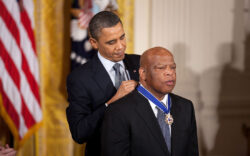Millions of people in the United States, Mexico and Canada gazed heavenward on Apr. 8 as a total eclipse of the sun brought much-needed awe and wonder to an often divided and contentious Planet Earth.
For a few brief minutes, disparate groups were united over something transcendent. Like the solar eclipse of 2017, the recent eclipse gave viewers an experience that inspired and uplifted those of every religion or no religion at all who stood in the path of the moon’s fleeting shadow. The eclipse showed mortal Earthlings who’s really the boss when Mother Nature and Father Time did their stately rendezvous, and the cratered moon veiled the fiery face of the sun.
It was fitting that the Apr. 8 total eclipse of the sun came just two weeks before the annual Earth Day events on Apr. 22. When the moon covers the sun with a cosmic curtain, the drama reminds humans of their precious time here on Earth. We need a sense of wonder and a sense of history, and cosmic events like eclipses provide both.
When Earth Day began in 1970, Americans by the millions rallied to the cause of maintaining a livable home planet just months after sharing the wonder of photos of our fragile Earth taken by astronauts on the moon. Earth Day began during the presidency of Richard M. Nixon, who later left the White House trailing clouds of ignominy in the wake of the Watergate scandal. For all his faults, Nixon did spearhead the creation of the Environmental Protection Agency. He was right when he said, “The Congress, the administration and the public all share a profound commitment to the rescue of our natural environment, and the preservation of the Earth as a place both habitable by and hospitable to man.”
A century before Nixon ushered in the EPA, a victory for the environment was scored by another Republican whose White House years were marked by the stench of scandal. President Ulysses Grant in 1872 signed legislation that created Yellowstone National Park, the first official U.S. national park. Though he never visited Yellowstone, to this day visitors at the park’s entrance see words from the law Grant signed to preserve its grandeur “for the benefit and enjoyment of the people.”
During his presidency from 1901–1909, Republican Theodore Roosevelt earned his nickname, the Great Conservationist. His efforts to preserve natural sites across America when the 20th century was young still benefit Americans today as the 21st century limps on. It is appropriate that a national park in the rugged Badlands of North Dakota is named for Theodore Roosevelt, the “cowboy president” who said, “Here is your country … Do not let selfish men or greedy interests skin your country of its beauty, its riches or its romance.” His words still resonate today when mining interests threaten to spoil the beauty of Georgia’s magical and mysterious Okefenokee Swamp.
Democrat Franklin Roosevelt recognized the importance of the environment during his presidency that spanned the Great Depression and World War II. He created the Civilian Conservation Corps that provided jobs planting trees, blazing wilderness trails and building campgrounds during America’s hard times. “There is nothing so American as our national parks,” he said. In the 1960s John Kennedy agreed with FDR, calling environmental preservation a way of “ensuring that future generations may know the majesty of the Earth as we know it today.”
President Jimmy Carter said, “Love of nature is a common language that can transcend political or social boundaries.” Even Ronald Reagan, the Republican who defeated Carter in 1980, paid lip service to the ideals of Earth Day when he said in a State of the Union address that “Preservation of our environment is not a liberal or conservative challenge. It’s common sense.”
In his inaugural address in 2021, President Joe Biden warned that “a cry for survival comes from the planet itself.” His Republican rival, former President Donald Trump, has called conservationists “prophets of doom.” Politicians fight over the fate of the planet, but Earth Day and the wonder of an eclipse remind us of the truth of Shakespeare’s words: “One touch of nature makes the whole world kin.”
Like what you just read? Support Flagpole by making a donation today. Every dollar you give helps fund our ongoing mission to provide Athens with quality, independent journalism.









